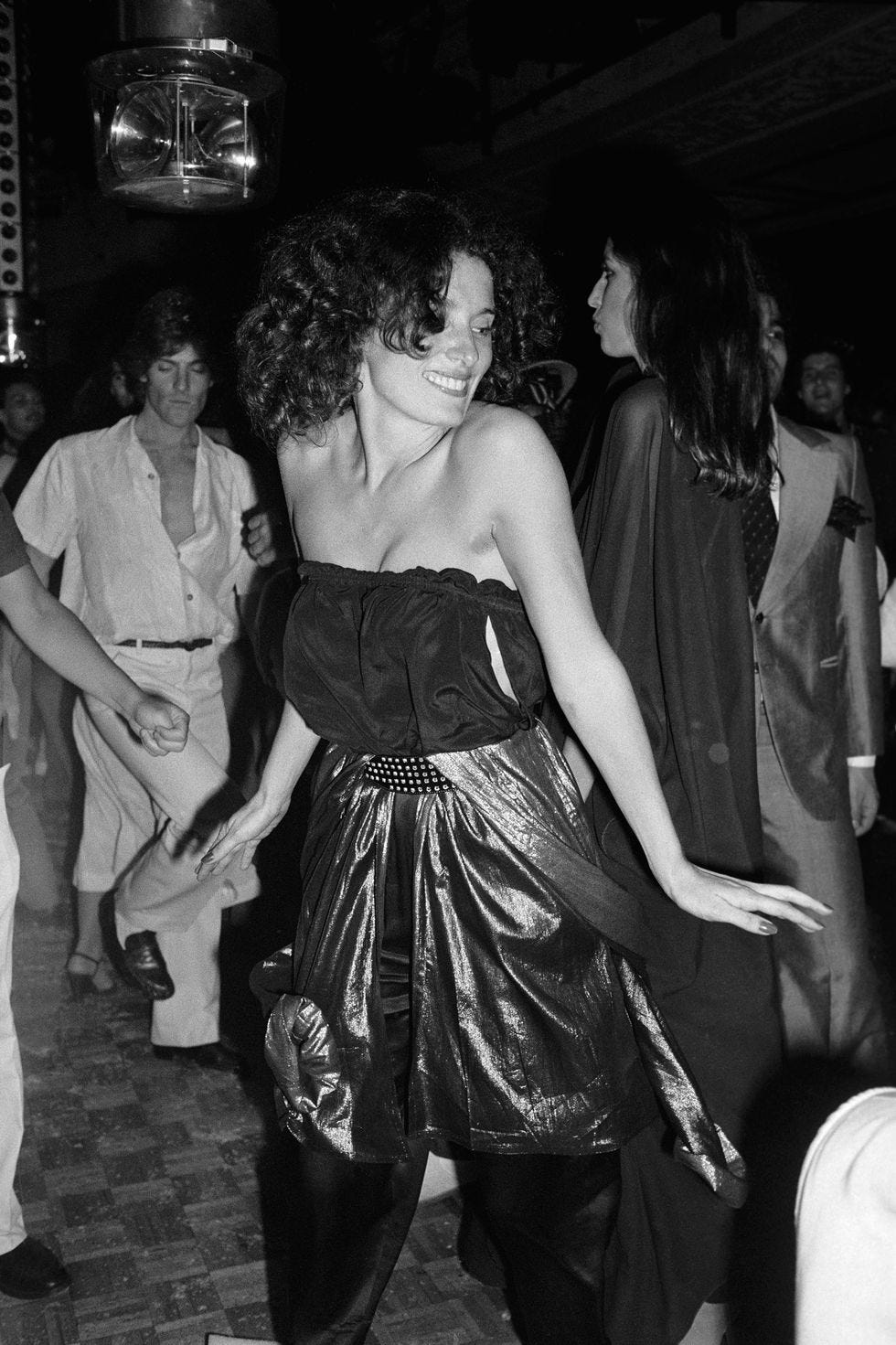There’s a Crack in Everything, That’s How The Light Gets In
Wisdom from Margaret Trudeau and Leonard Cohen, from Morocco to Montreal
“Is that Margaret Trudeau?” My sister and I turned to face the photo our mom was looking at. It was one of several iconic black-and-white shots that popped against the glitzy gold wall at Marcus restaurant, where we having brunch in celebration of my brother and his fiancée who’d just returned to Montreal newly engaged.
At the time, I didn’t know much about Margaret Trudeau other than she was our former Prime Minister the late Pierre Trudeau’s ex-wife and our current Prime Minister Justin Trudeau’s mother. Turns out she was a lot more than that and bore a celebrity status in her heyday. The photo below captures her dancing at Studio 54—New York’s most legendary nightclub—where she was a frequent guest partying with everyone from the Rolling Stones to Andy Warhol.
My sister confirmed it was Margaret Trudeau and suggested I read her autobiography, Changing My Mind, which chronicles her battle with bipolar disorder throughout her tenure as the Prime Minister’s wife—a marriage many considered doomed from the start given the couple’s staggering 29-year age gap.
“Bipolar disorder (formerly called manic-depressive illness or manic depression) is a mental illness that causes unusual shifts in a person's mood, energy, activity levels, and concentration. These shifts can make it difficult to carry out day-to-day tasks.”
—National Institute of Mental Health
I finally got around to reading Margaret’s book on vacation last week (it’s a great read but in hindsight, it’s heavy for vacation). For the bulk of the story, Margaret’s life is a paradox of looking carefree from the outside while she’s suffering on the inside. And she’s widely criticized for leaving her husband—Canada’s Prime Minister at the time—with their young sons in Ottawa to run wild in New York. The worst instance of this is when Margaret is photographed partying at Studio 54 the night Pierre is voted out of office—a devastating defeat made more humiliating given his estranged wife is out clubbing during the media circus (though Margaret explains in the book she couldn’t fathom he might lose and felt terrible in the aftermath).
The Dangers of “Moulding”
Margaret shares in her book that Pierre, who was 51 when they wed, thought he could mould her, then 22, into his ideal wife. Her story bears a solemn resemblance to that of the late Princess Diana who was selected for then Prince Charles because she was regarded as “young and naive,” and thus the perfect clay to mould into the future Queen of England.
Both scenarios ended disastrously after decades of suffering. Both women endured pain caused by mental health issues and extreme isolation largely due to the stigmas that surrounded such topics at the time and the pressures of maintaining perfect public personas.
Moulding can be a self-inflicted endeavour as much as it can be imposed by others. So next time something feels forced or unnatural, ask yourself, am I trying to mould myself into something or someone I’m not?
From Morocco to Montreal
“For an entire generation of youth in the late 1960s and ‘70s, the travel destination of choice was Morocco—the food was cheap, the dope plentiful and the culture exotic, and the beaches and warm sun beckoned.
Perversity and a desire to irk my father (who was appalled at the idea) simply made Morocco that much more appealing.”
—Margaret Trudeau in her book Changing My Mind
Early in her book, Margaret recounts meeting two people in Morocco who had a “profound” effect on her. One of them was Montreal artist and musician Leonard Cohen. The two spent several days together talking “through the night, going down roads of spirituality [Margaret] hadn’t imagined existed.”
Fast forward to the latter half of the book, and Margaret recounts how over twenty years later, Leonard’s song “Anthem” gave her a powerful metaphor for her mental health struggles:
“There’s a crack in everything, that’s how the light gets in.”
—Leonard Cohen in his song Anthem
It seemed synchronistic to me that the Montreal restaurant where I first saw Margaret’s iconic photo overlooks this mural of Leonard Cohen:
I listened to Leonard’s song “Anthem” for the first time after reading Margaret’s book. And what I love in addition to the lyrics she shared, is the line that precedes them. Here it is:
“Forget your perfect offering
There is a crack, a crack in everything
That’s how the light gets in.”
“Forget your perfect offering” is a means of empowerment. It’s a call to action and the subsequent lines about a crack giving way to light are rationales in support of it. It’s beautiful.
According to an article published in the wake of Leonard’s death in 2016, he “didn’t like explaining his music” but shared some rare insights about his song “Anthem” on a radio special (though the transcript—which was published on a fan site—hasn’t been verified). Regardless of whether Leonard shared this interpretation or not, it resonated with me:
“There is a crack in everything that you can put together: Physical objects, mental objects, constructions of any kind. But that’s where the light gets in, and that’s where the resurrection is and that’s where the return, that’s where the repentance is. It is with the confrontation, with the brokenness of things.”
Pattern Breaks
Fresh back from vacation this week, I think time away from work can serve as an ideal “crack.” Any form of “pattern break” that extracts you from your day-to-day routine and forces you to reckon with a new perspective on your life is a means of illumination. It’s an opportunity to hit pause, zoom out, and ask yourself, am I truly happy or just comfortable? If it’s the latter, you need to ask yourself some follow-up questions, like what would make me happy? What steps can I take to that end?
The same exercise applies to illness, burnout, and any other form of pain. Don’t think of it as a barricade you need to remove with brute force. That’s punishing yourself when you’re already struggling (trust me, I’ve tried that and it just makes everything worse). Instead, embrace pain and struggle as cracks shining light into your darkness. Ask yourself, if I stop and reflect, what can I see? How do I feel? Let your intuition guide you and be kind to yourself in the process.
Reason Versus Passion
In her book, Margaret describes many manic episodes she had over the course of her marriage to Pierre Trudeau but one in particular reminded me of a favourite quote (which I’ll share afterwards). As the story goes, one of Pierre’s prized paintings was captioned “Reason over Passion” and Margaret found this infuriating as it articulated the essence of his shortcomings as a husband—namely, his emotional unavailability. So in an act of rage brought on by her bipolar disorder, Margaret cut out the caption and reordered the words to read “Passion over Reason”—a fitting motto for her at the time given she was at the mercy of her mood swings without realizing it.
Pierre was equally livid to discover she had defaced his artwork and had a staffer revert the caption to its original form: “Reason over Passion.” In any case, most of us would benefit to strike a balance between such opposing stances. Hence why I’ve always loved this quote:
“Your reason and your passion are the rudder and the sails of your seafaring soul.
If either your sails or your rudder be broken, you can but toss and drift, or else be held at a standstill in mid-seas.
For reason, ruling alone, is a force confining; and passion, unattended, is a flame that burns to its own destruction.”
—Khalil Gibran
If I had to sum up the Trudeaus’ marriage based on Margaret’s autobiography, I would say this: Pierre was a force confining and Margaret was a flame that burned to its own destruction. But fortunately, as individuals, they went on to be successful in subsequent relationships. Not to mention, they successfully co-parented their children—one of which now serves as Prime Minister of Canada.
My question to you is, where do you fall on the spectrum between reason and passion, and if need be, how might you strike a healthier balance?
Thanks for reading and have a wonderful week,
P.S. If you enjoyed this edition, drop a like or comment to let me know.
⏩ If you want to help me promote my newsletter, share this one with friends.
💻 If you want to build a cohort-based course, join my Course + Community of Practice.
☕ If you want to grab coffee in Montreal, hit reply to let me know when you’re in town.






I think this is my favorite essay of your's yet. First, this observation is so astute. "Moulding can be a self-inflicted endeavour as much as it can be imposed by others." And in my own self-observation I'd say that moulding is actually even more inflicted from within than imposed. That may not be true in childhood, where we have no choice but to adopt the ways of our caregivers to get the love that we need, but at a certain point we are the only ones who are driving compliance to fixed models of behavior.
This idea leads so beautifully to your highlight of Leonard Cohen's advice to "forget your perfect offering" - encouragement that could hardly be more on point for those of us attempting to make a living as guides, teachers, or content creators. You talk about the need for pattern breaks, and the kind of literal vacation break you describe is certainly useful, though I am most intrigued by introducing catalysts for relaxation right into the middle of the "job" and practicing to find a way to make the work fun and easy. Though that idea runs counter to my self-moulding, which is that work has to feel like WORK!
Finally, you talk about the required co-existence of reason and passion, a final gem you weave into this masterful essay centered on the journey of Margaret Tredeau. The need for that blend is near and dear to my heart as a balance of the two are essential to my primary vocation as a professional speaker. New forms of reasoned perspective is the deliverable when speaking to an audience, but passion is the delivery vehicle. And the same could be said for our writing, which you have just demonstrated so beautifully in this very article of yours.
Thanks for the work you put into it.
Rick summed up what I had to say. Fabulous piece, Alexandra.
I'd say I fall on the passion side of the spectrum, and I don't know whether that is a good thing or not!